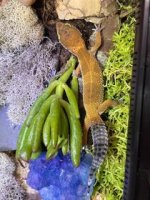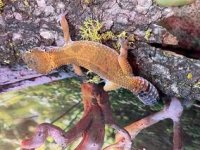You are using an out of date browser. It may not display this or other websites correctly.
You should upgrade or use an alternative browser.
You should upgrade or use an alternative browser.
Guess that morph!
- Thread starter Kyuubi
- Start date
Does anyone know? Some sort of tangerine? Green? Anyone with more knowledge please let me know, I’m planning on breeding her eventually so I’m trying to pin point her exact morph or close to it without breed testing initially. I think the breeder just called her an orange gecko so I know that’s not the correct name lol. I’ll be getting a white and yellow Tangerine Raptor male to breed her with when she is good and ready, so if anyone could identify her morph, or any possible baby outcome morphs, that would be amazing thank you!!
My set ups are bioactive on clay soil substrates.
My set ups are bioactive on clay soil substrates.
panthergecko
Active member
Some more pictures, especially when they were younger would help with the identification of her morph
At this point I would call her a super hypo (no body spots) tangerine (orange colored) baldy (no head spots). You can see the hatchling pattern faintly and it looks as if some of the bands on the body are broken but not the tail, so you could call it "aberrant" as well. The "green" look, in my opinion is just the coloration from the fading black bands with the orange coloring.
As far as breeding goes, it would be good, if possible, to find out if the breeder knows whether or not the gecko has any recessive genes, which could be important especially since you want to breed her with a Tremper albino. It would be good to know for sure that the female doesn't have Bell or Rainwater recessive albino genes. There is a chance that some of the offspring could be stripes or jungles given the broken body bands of this gecko.
Aliza
As far as breeding goes, it would be good, if possible, to find out if the breeder knows whether or not the gecko has any recessive genes, which could be important especially since you want to breed her with a Tremper albino. It would be good to know for sure that the female doesn't have Bell or Rainwater recessive albino genes. There is a chance that some of the offspring could be stripes or jungles given the broken body bands of this gecko.
Aliza
At this point I would call her a super hypo (no body spots) tangerine (orange colored) baldy (no head spots). You can see the hatchling pattern faintly and it looks as if some of the bands on the body are broken but not the tail, so you could call it "aberrant" as well. The "green" look, in my opinion is just the coloration from the fading black bands with the orange coloring.
As far as breeding goes, it would be good, if possible, to find out if the breeder knows whether or not the gecko has any recessive genes, which could be important especially since you want to breed her with a Tremper albino. It would be good to know for sure that the female doesn't have Bell or Rainwater recessive albino genes. There is a chance that some of the offspring could be stripes or jungles given the broken body bands of this gecko.
Aliza
So she’s about 6 months, not fully grown yet. I’ve lost the number of the original breeder, but I’m just starting to look into genetics. Why is it important to figure out if she’s recessive for bell or rainwater? Are there some things that can go wrong?
Last edited:
There is no way to know what strain of albino she is. Although there are some reports that it's actually physically problematic to breed different strains of albino, it's really more of an issue of muddying the genetics so geckos are being produced where it's not clear which albino strain genes they carry. Although not everyone follows this, in general the safest breeding plan is to use geckos of known genetic backgrounds.
Aliza
Aliza
There is no way to know what strain of albino she is. Although there are some reports that it's actually physically problematic to breed different strains of albino, it's really more of an issue of muddying the genetics so geckos are being produced where it's not clear which albino strain genes they carry. Although not everyone follows this, in general the safest breeding plan is to use geckos of known genetic backgrounds.
Aliza
Is there no safe way to test for an albino morph with different morphs?
The only way to know what strain of albino you have is to take your best guess, breed it with another gecko of that strain and see what you get. If you get albinos, you now know what strain your gecko is (of course, there's a chance that it has genes for more than one strain, but let's not go there now). If you get no albinos, you can only surmise that your gecko is not from that strain. Now you have offspring who are het for 2 different albino strains and many people would say that you really shouldn't sell them (because even if you sell them "pet only" you have no control over what others will do). It's not ideal, but, as someone who was stuck with 30 hatchlings 4 years ago when my geckos were diagnosed with crypto, I can tell you that keeping them all if definitely possible.
Aliza
Aliza
The only way to know what strain of albino you have is to take your best guess, breed it with another gecko of that strain and see what you get. If you get albinos, you now know what strain your gecko is (of course, there's a chance that it has genes for more than one strain, but let's not go there now). If you get no albinos, you can only surmise that your gecko is not from that strain. Now you have offspring who are het for 2 different albino strains and many people would say that you really shouldn't sell them (because even if you sell them "pet only" you have no control over what others will do). It's not ideal, but, as someone who was stuck with 30 hatchlings 4 years ago when my geckos were diagnosed with crypto, I can tell you that keeping them all if definitely possible.
Aliza
Thank you Aliza! Her first clutch I can try with my tremper male, if they come out non albino, I definitely have the room to keep them just in case
Keep us posted!
Aliza
Will do!! She’s still not at an adult breeding age so when she is in a few months I’ll post on this thread again!
-Natalie




